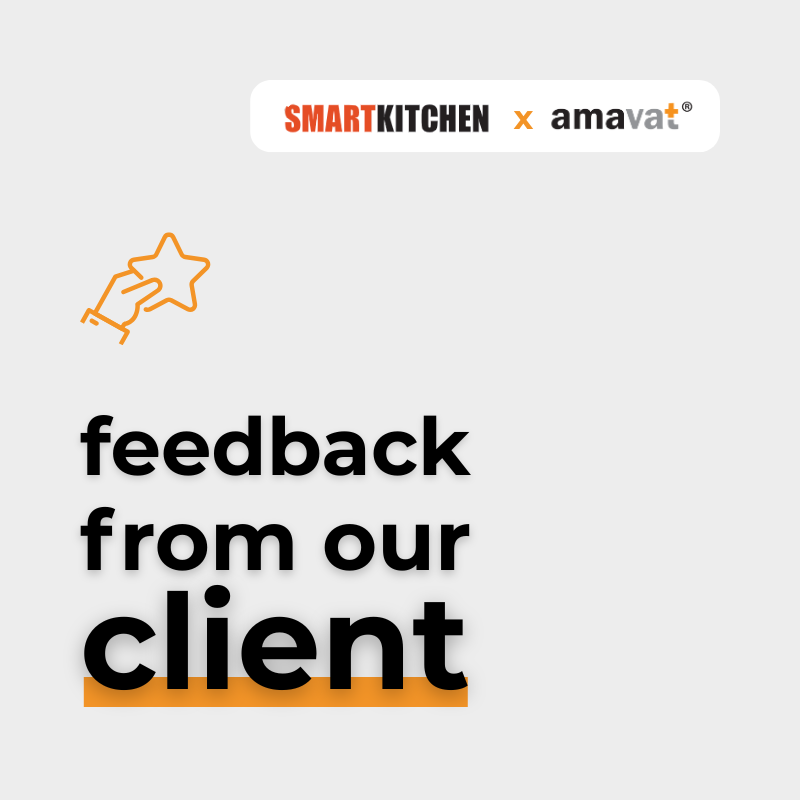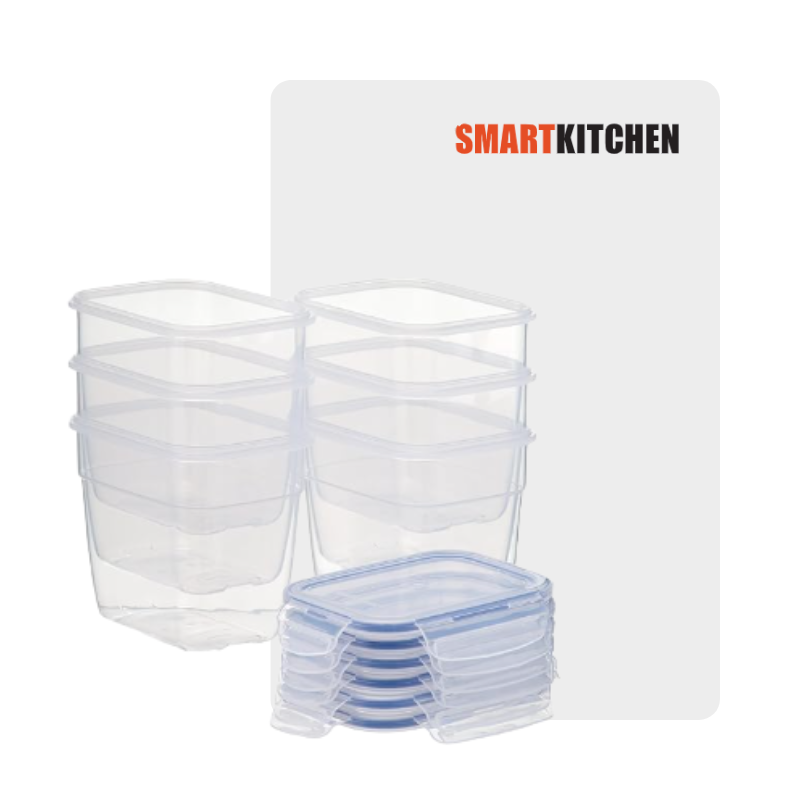SmartKitchen: how amavat restored e-commerce continuity in Poland

Spis treści
Introduction
But entering a new market isn’t just about opportunities – it’s also about responsibilities. For cross-border e-commerce, one of the most crucial issues is VAT registration and compliance. In theory, it sounds like a formality. In practice? It’s often a minefield that can stall business growth overnight.

The challenge
At the beginning of 2025, SmartKitchen faced a serious crisis. Although the company was gaining more and more customers in Poland, it suddenly turned out that its VAT number had been removed from the register. And without an active VAT number… sales in Poland came to a halt.
The cause was a gap in tax compliance. SmartKitchen had previously worked with an international accounting and tax service provider. At first, everything seemed fine – but in October 2024, the provider inexplicably stopped filing VAT returns in Poland. Worse still, they failed to inform SmartKitchen about it.
The result? The Polish tax office quickly noticed the missing filings, and in March 2025, SmartKitchen was struck off the VAT register. That triggered a chain of serious problems:
- Sales frozen – without a VAT number, legal sales in Poland were impossible.
- Risk of financial penalties – missing returns meant potential fines from the tax office.
- Tax uncertainty – some returns had been filed without the client’s knowledge, raising questions about their accuracy.
- Reputation damage – a brand known for quality and transparency now risked losing credibility on a key market.
For SmartKitchen’s management, this wasn’t just an operational setback – it was a major source of stress. The thought of losing access to a market of nearly 40 million consumers was simply unacceptable.
Internal tension
The situation was further complicated by SmartKitchen’s own approach to dealing with tax authorities. Like many fast-moving e-commerce businesses, the company preferred quick, remote collaboration. Phone calls, formal meetings, lengthy procedures? To them, these were barriers that slowed down growth. And it made sense – while expanding into Western markets, every day of downtime meant real financial losses.
On top of that, the lack of transparent communication from the previous provider had eroded the company’s trust in tax specialists altogether. As a result, SmartKitchen needed a partner who could not only take over the heavy administrative work but also operate on their terms: fast, flexible, and in their preferred communication style.
Challenge summary
By April 2025, SmartKitchen’s situation looked critical:
- no active VAT number in Poland,
- an incomplete and potentially incorrect filing history,
- growing time pressure to resume sales,
- and a sense of losing control over tax compliance.
At this turning point, SmartKitchen reached out to us with a clear expectation: help us restore order, recover our VAT number, and ensure full compliance in Poland.
Our approach
1. Diagnosing the situation and first contact with the tax office
The first step was to understand what exactly had gone wrong in Poland. Our team immediately called the local tax office to check SmartKitchen’s status. It quickly turned out that the issue wasn’t just one missing return – since October 2024, an entire series of VAT reports had never been filed by the previous provider.
At that point, we knew this wouldn’t just be a quick rescue mission. A thorough clean-up of the tax history would also be needed.

2. Flexible communication
In such cases, the standard step would usually be to suggest a meeting or a conference call. However, as a fast-growing e-commerce business operating across multiple markets, SmartKitchen prioritizes efficiency – their preferred channel was quick and transparent email communication.
Instead of pushing for traditional solutions, we adapted to their way of working. We prepared clear, step-by-step instructions on how to gather and provide the transaction data needed to complete the missing VAT filings. As a result, the process ran smoothly, and SmartKitchen was able to track progress in real time while maintaining full control over the situation.
3. Preparing the documentation
At the same time, we got to work on the formalities: powers of attorney, applications, and forms required to officially take over tax representation. Each document was carefully explained via email so that signing didn’t become yet another hassle. As soon as the completed forms came back, we submitted them to the tax office and launched the official process.
4. Working with the data and verifying accuracy
We used the waiting time for power of attorney approval as productively as possible – by diving into the client’s data. There were some technical challenges with file formats and system compatibility. But instead of treating this as a problem, we turned it into an advantage: verifying data accuracy along the way. By the time the documents reached the tax office, we were fully prepared and confident that the reports were consistent and correct.
5. Discovering errors from the previous provider
Once we gained access to the electronic tax systems, it became clear that the previous provider had filed some VAT returns – but without informing SmartKitchen. The problem? Some of those returns appeared to contain errors.
This meant our role went far beyond simply reinstating the VAT number. We also had to clean up the filing history to prevent future audits or further complications.
6. Revoking authorization and retrieving documents
The next step was to officially revoke the previous provider’s authorization. We also submitted a formal request to the tax office for all VAT returns they had filed on behalf of SmartKitchen. This was crucial – only then could we fully analyze what had been done and prepare a detailed correction plan.
7. Re-registration and filing the missing returns
Time was working against SmartKitchen, so in parallel with these procedures we filed the missing VAT returns and submitted the reinstatement request. Thanks to solid preparation and complete documentation, the tax office approved the application.
The result? SmartKitchen regained its Polish VAT number, was able to legally resume sales, and restored full business continuity in Poland.
Results and solutions
1. VAT number reinstated
The most important outcome? SmartKitchen regained its Polish VAT number. After just a few weeks of intensive work, the tax office approved our filings and the missing returns. This meant the company could immediately resume sales in Poland and stop the spiral of financial losses.
The moment the VAT number was reactivated was a real turning point – it closed the crisis chapter while opening the way to cleaning up past discrepancies.
2. Reviewing the previous provider’s filings
Once we finally received copies of the VAT returns submitted by the previous provider, the painstaking work began: comparing them with SmartKitchen’s transaction data, line by line.
The conclusions were clear – discrepancies and errors. Issues that could not only distort the books but also lead to audits and serious problems down the road. It became obvious that VAT reinstatement was just the first step. Without fixing the past, the risk would remain.
3. Corrections and cleaning up tax history
Based on these findings, we created a corrective action plan. Together with SmartKitchen, we filed the necessary amended VAT returns to align the official records with the actual transactions.
What mattered most – even though there were more corrections than initially expected, we honored the original fee estimate. No extra costs for the client. This gave SmartKitchen the certainty that their filings in Poland were 100% accurate, transparent, and compliant – exactly what both institutions and customers expect.
4. Regaining control and trust
Beyond the measurable results, there was another equally important outcome: a sense of control. For the first time in months, SmartKitchen’s management had full visibility into their VAT situation in Poland. They knew exactly what had been done, which errors were corrected, and what safeguards were in place for the future.
And with that came something else – renewed trust in professional advisors, which had been badly shaken by their previous provider.
5. Expanding the partnership
The story in Poland didn’t just end with success – it became the start of something bigger. SmartKitchen decided to entrust us with VAT compliance in additional markets: Germany, France, the Czech Republic, the UK, Spain, and Italy.
For the client, this meant one thing: their entire international e-commerce operation now had a single point of contact and one coordinated competence center. For us, it meant the satisfaction of turning a crisis project into a long-term partnership built on trust.
Key takeaways and values
The SmartKitchen story shows, in no uncertain terms, what e-commerce businesses face when operating across multiple countries. Borders may not exist in online trade, but tax rules are a completely different story – local, complex, and full of pitfalls. Just one small oversight can lead to major consequences: sales suspension, financial penalties, or even reputational damage.

For SmartKitchen, the problem was both real and painful. Being struck off the VAT register in Poland meant the risk of halting operations in one of their most important markets. Worse still, the provider who was supposed to ensure compliance not only failed to do their job but also acted without the client’s knowledge. At that point, it was no longer just about bookkeeping – it was a threat to the entire business model.
Thanks to working with us, SmartKitchen regained both security and peace of mind. And our work highlighted the core values that define how we operate every day:
- Flexibility – we adapted to the client’s preferred communication style so everything could run quickly and smoothly.
- Thoroughness – every figure, every document, every return was double-checked down to the last detail.
- Transparency – the client had full visibility into what was done and what actions were taken.
- Effectiveness – in a short time, we reinstated the VAT number and brought order to a situation that could have blocked all sales.
- Partnership – instead of stopping at “firefighting,” we expanded cooperation into additional countries with a long-term model of support.
This case also offers a valuable lesson for other businesses. It shows that choosing the right tax partner is a strategic decision – on par with selecting a logistics provider or a technology partner. Without well-managed VAT compliance, even the fastest-growing e-commerce company can suddenly hit a wall.
Today, SmartKitchen operates in Poland and across other markets with complete confidence, allowing their team to focus on what truly matters – growing sales and delivering innovative products to customers across Europe. For us, it’s a source of pride to have been part of this journey and to know that out of a crisis, we helped build a solid foundation for future expansion.
Conclusion
The SmartKitchen story is more than just a case study about reinstating a VAT number in Poland. It’s an example of how a seemingly technical tax issue can escalate into a full-blown crisis that halts business growth. Just a handful of neglected filings can suddenly stop a fast-growing company from selling in a key market. In the world of e-commerce, where speed and continuity are everything, that can mean months of lost progress.
Thanks to efficient collaboration, we didn’t just put out the fire – we built something more lasting: a sense of security and the confidence that SmartKitchen’s VAT compliance is in safe hands. It’s proof that professional tax services go far beyond submitting forms. At its core, it’s about strategic risk management, anticipating consequences, and making decisions that protect a business from costs – or even from a total operational shutdown.
This story also shows that a great advisor isn’t just an expert, but a partner. A partner who listens, adapts to the client’s way of working, and shoulders the burden of complex procedures, so that entrepreneurs can focus on what truly matters – growing their business. Flexibility, thoroughness, and transparency – these were the values that rebuilt SmartKitchen’s trust and transformed a crisis collaboration into a long-term partnership.
Today, SmartKitchen operates in Poland without obstacles and continues expanding into new markets, knowing that their tax compliance is fully under control. A crisis that could have ended their presence in one of the EU’s largest markets instead became a turning point – an opportunity to streamline processes and build a solid foundation for further expansion.
For other e-commerce companies, this story can serve as both a warning and an inspiration. A warning that lack of control over VAT can quickly lead to serious trouble. And an inspiration that even in the toughest situations, solutions can be found – provided you have a partner who combines technical expertise with a real understanding of business.
For us, it’s yet another proof that taxes don’t have to be a barrier to growth. When planned and managed properly, they become a source of support – and a guarantee of peace of mind for the future.

